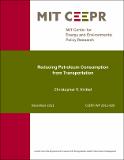| dc.contributor.author | Knittel, Christopher R. | |
| dc.date.accessioned | 2012-05-16T20:45:45Z | |
| dc.date.available | 2012-05-16T20:45:45Z | |
| dc.date.issued | 2011-12-01 | |
| dc.identifier.uri | http://hdl.handle.net/1721.1/70854 | |
| dc.description | http://web.mit.edu/ceepr/www/publications/workingpapers.html | en_US |
| dc.description.abstract | The United States consumed more petroleum-based liquid fuel per capita than any other OECD- high-income country- 30 percent more than the second-highest country (Canada) and 40 percent more than the third-highest (Luxemburg). This paper examines the main channels through which reductions in U.S. oil consumption might take place: (a) increased fuel economy of existing vehicles, (b) increased use of non-petroleum-based low-carbon fuels, (c) alternatives to the internal combustion engine, and (d) reduced vehicles miles travelled. I then discuss how the policies for reducing petroleum consumption used in the US compare with the standard economics prescription for using a Pigouvian tax to deal with externalities. Taking into account that energy taxes are a political hot button in the United States, and also considering some evidence that consumers may not correctly value fuel economy, I offer some thoughts about the margins on which policy aimed at reducing petroleum consumption might usefully proceed. | en_US |
| dc.language.iso | en_US | en_US |
| dc.publisher | MIT CEEPR | en_US |
| dc.relation.ispartofseries | CEEPR Working Papers;2011-020 | |
| dc.rights | An error occurred on the license name. | en |
| dc.rights.uri | An error occurred getting the license - uri. | en |
| dc.title | Reducing Petroleum Consumption from Transportation | en_US |
| dc.type | Working Paper | en_US |
| dc.identifier.citation | WP-2011-020 | en_US |
